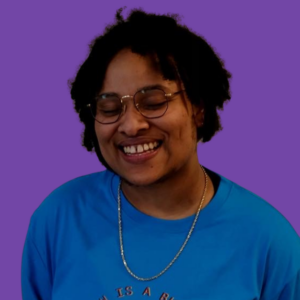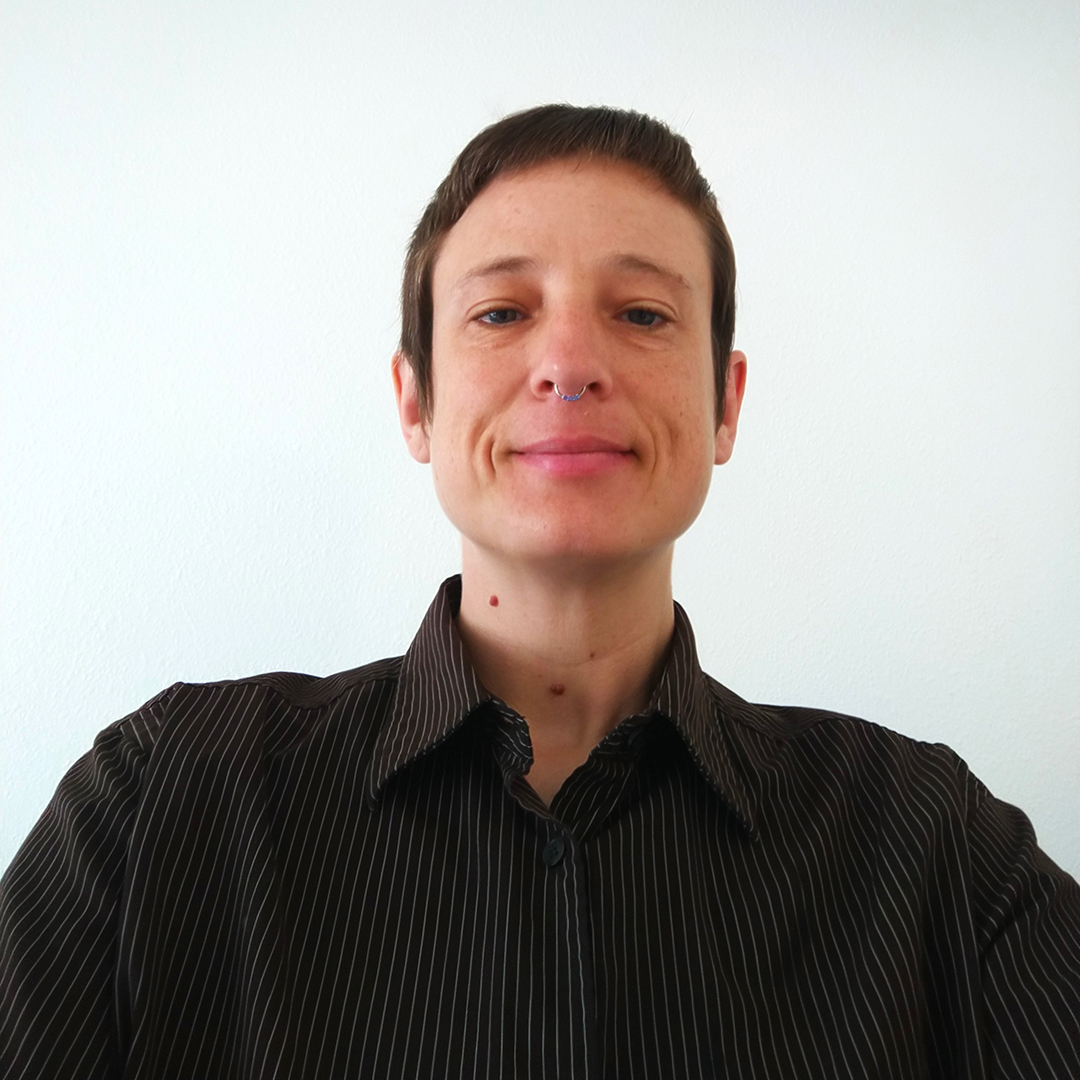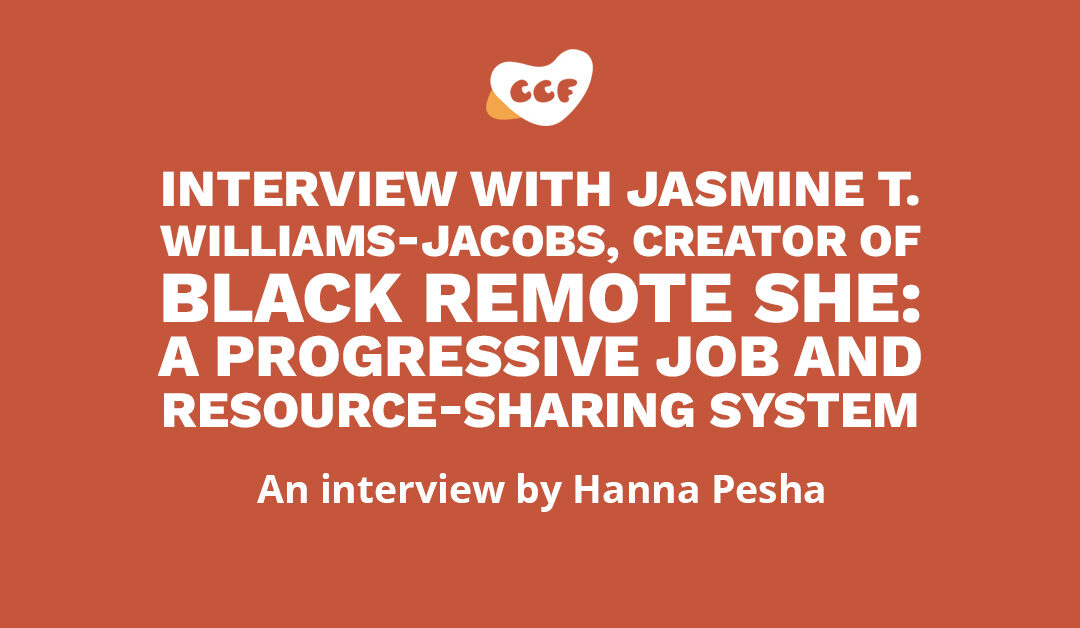By Hanna Pesha, radical queer grant writer
Black Remote She is transformative by nature, tilling the soil of the job market to make it more equitable for all involved and addressing the present-day and historical injustices that workers encounter.
 Jasmine T. Williams-Jacobs (all pronouns) is the founder and director of Black Remote She, a community-driven platform for Black queer, trans, nonbinary people, and allies interested in working remotely.
Jasmine T. Williams-Jacobs (all pronouns) is the founder and director of Black Remote She, a community-driven platform for Black queer, trans, nonbinary people, and allies interested in working remotely.
As a self-proclaimed equity enthusiast and radical communicator, Jasmine launched Black Remote She to connect Black 2SLGBTQIA+ people and allies with equitable work cultures and gender-affirming resources. Using their passion and background in digital organizing and community engagement, Jasmine manages Black Remote She as a progressive job and resource-sharing system.
I encountered Jasmine leading a workshop at Do Something: Identity(ies) Conference 2024, hosted by Van Ethan Levy at the end of May of this year. I was especially interested in attending Jasmine’s workshop, Reinforcing Equity, Psychological Safety and Inclusion in the Workplace, as I was in a destructive work environment myself at the time.
Jasmine’s work is especially appropriate for The Hub because of the way their work upholds the second principle of CCF: Individual organizational missions are not as important as the collective community. Black Remote She is transformative by nature, tilling the soil of the job market to make it more equitable for all involved and addressing the present-day and historical injustices that workers encounter.
Hanna Pesha: I understand that Black Remote She grew out of a YouTube channel that you started in 2019. What prompted you to start that channel and then make the transition to a full community platform?
Jasmine T. Williams-Jacobs: Yes! In September 2019, I started the YouTube channel as an educational tool around remote work, which wasn’t something many Black and Brown folks around me were familiar with at the time.
Remote work became a safe haven for me after leaving a particularly traumatic in-person workplace, and I wanted other Black and Brown folks to know it was an option for them, too. In February 2020, I decided to create a community platform to broaden my reach and start sharing direct job opportunities with job seekers interested in working remotely.
Since that time, it’s continued to evolve as a community space for folks interested in working and networking remotely to maintain community connection in virtual spaces.
HP: When I got to hear you at the Do Something: Identity(ies) Conference at the end of May, you were marking four years since the founding of your organization. Can you talk a little bit about founding that organization on the heels of the police murders of Ahmaud Arbery, Breonna Taylor, and George Floyd, and how the awareness cracked open by those acts of terrorism affected your work?
JW-J: It was an emotional time for me and the Black Remote She community at large, but also an incredibly transformative time. Folks were finding refuge in transitioning to remote work, both as a protection from COVID-19 and to move away from workplaces that didn’t make space for the wave of grief impacting Black folks.
It was also an awakening moment around how much emotional labor organizations were expecting from Black people in their organizations, including expectations for Black folks to lead work to organize DEI statements and other labor focused on advancing org-wide DEI efforts, regardless of their department.
It became clear that a vetting process was needed on the platform to protect our communities from being exploited in the workplace moving forward.
HP: Do you feel that your personal values prompted you to found Black Remote She, and if so which ones and how did you come by them?
JW-J: Absolutely! I’m a strong believer in community care and centering the well-being of people impacted by systemic oppression. I wanted to create a space where Black folks could feel empowered to find flexible work opportunities and gender-affirming resources to support their livelihood. I feel like my personal values are rooted in ancestral legacies of the many Black queer and gender-expansive leaders and organizers before me.
HP: One of the things you talk about is Black, Brown, and LGBTQI+ communities deserving the comfort of being themselves in the workplace. Can you speak to that a little more? What do you think that feels like on a felt body level?
JW-J: Whether it’s code-switching or masking femme or masc presentation, our comfort hasn’t been a priority in the workplace. I wanted to shift that and create a space for our community to connect with gender-affirming spaces where we could show up and be comfortable to be exactly as we are.
On a body level, I think that feels like being grounded in our bodies – feeling comfortable to show up without modifying or adjusting the way we dress or speak, but fully showing up as ourselves, with the boundaries we need to protect and make space for autonomy and well-being.
HP: You talk about workplaces needing to be holistic, anti-oppressive, and people-centric. Can you speak more to what that looks and feels like, or give examples?
JW-J: Too many workplaces have forgotten to hold space for whole humans and people existing as more than a worker. We’re operating under systems of injustice and oppression all the time, but workplaces have a responsibility to dismantle systemic oppression to make space for equity, inclusion, and safety in their work culture, especially when they’re naming commitments to diversity, equity, inclusion, accessibility and belonging with specific invitations to Black, Brown, 2SLGBTQIA+, and disabled communities.
HP: What is it about remote work that can offer a haven to those in Black, Brown, LGBTQI+, and disabled communities?
JW-J: One of the biggest perks of remote work is the flexibility to work from a space that feels most comfortable, accessible, and affirming for the person. For folks looking for that option in their work style, remote work offers that haven for us.
Studies have also shown that remote work limits microaggressions in the workplace. However, even though I can attest to experiencing less microaggressions in remote workplaces, it didn’t eliminate them. I’m always encouraging folks to ensure workplaces (regardless of location) align with your values and can accommodate your individual needs.
HP: Can you speak to accountability as a response to harassment and discrimination? Why is that important?
JW-J: To truly cultivate and maintain an affirming and equitable workplace, accountability is necessary. It creates space for restorative justice and harm reduction – allowing organizations to take responsibility and actively respond to harm in their workplace.
Without accountability, harm will continue to repeat itself without resolve or repair for the people impacted by that harm. Ultimately, lack of accountability results in loss of trust towards the people and/or organization, perpetuating cycles of harm, and communities will eventually lose faith in their ability to maintain a safe space.
HP: What is most important for recruiters to know about the communities they are marketing to? What responsibility do recruiters have to be transparent about the resources they can offer pertaining to DEI?
JW-J: Authenticity matters in all relationships, including professionally. When recruiters are wanting to be authentic about reaching Black, Brown, and 2SLGBTQIA+ people, they have to be thoughtful and aware of the oppression impacting our communities and how unconscious bias, lack of accountability in response to harm, and lack of transparency about their organization’s journey to maintaining an affirming and equitable workplace inflicts harm on our communities and, therefore, causes employees to lose trust for the organization(s) that lured them in under false pretenses.
When recruiters create an illusion of diversity by using DEI jargon as a marketing tool without the practices, policies, and work culture to match, they fail not only the people interested in applying, but also the organizations they’re recruiting for because it’s false advertisement.
HP: How does the work of Black Remote She further liberation for the communities it serves?
JW-J: I love this question.
Our basic human rights–including our right to publicly exist–have been targeted with limitations, restrictions, and removal across the globe. But Black Remote She fights against those barriers by working alongside the community to cultivate systemic change and advance collective liberation.
With a central focus on the future of work, the platform operates as a progressive system of job and resource sharing to prioritize and center community well-being and equitable wealth distribution. The job board is community-informed to hold workplaces accountable when they fail to maintain safe, affirming, and equitable spaces for us, and the resource hub responds to community needs with mutual aid services, legal support, gender-affirming support groups, and numerous other resources to fund and resource our communities.
HP: So…how does a person know when it’s time to leave a workplace?
JW-J: Such a good question! I always talk about the internal compass of noticing a workplace is out of alignment with your values. A few red flags to look out for are:
- Discrepancies in the work culture described to you in the interview process comparatively to being in the workplace;
- Experiencing being silenced, ignored, or gaslit when you share concerns related to the workplace;
- Lack of accountability in addressing concerns coming up about the workplace – either from your own reports or other employees.
Also, stay attentive to how you feel showing up to work and engaging with your team. If it feels uncomfortable, distressing, or energetically off in some way, it’s worth reconsidering if that’s the workplace for you.
HP: What does your consultancy work look like today?
JW-J: It varies! Outside of speaking engagements, my consulting work supports organizations with recruitment, DEIAB recommendations, and digital assessments to increase and center community engagement.
Additionally, I’ve offered consulting work to community members interested in transitioning to entrepreneurship and/or looking for guidance during their job search.
HP: What upcoming events can people catch you at to hear you speak?
JW-J: To stay tuned for future events, folks can sign up for the Black Remote She newsletter.
Learn more about Jasmine’s consultancy services here.

Hanna Pesha
Hanna Pesha (they/them) is a radical queer writer of grants, stories, plays, poems and articles.

